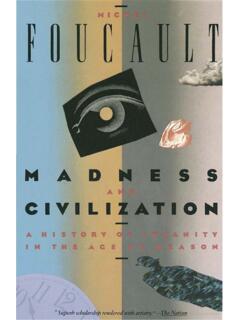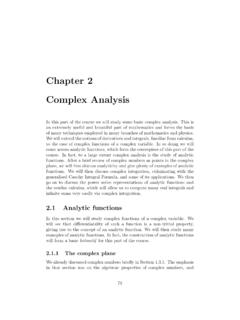Transcription of General System Theory - Monoskop
1 General By the same author: System Theory Modern Theories of Development (in German, English, Spani~h). Nikolaus von Kues Lebenswissenschaft und Bildung Theoretische Biologie J Foundations, Development, Applications Das Gef ge des Lebens Vom Molek l zur Organismenwelt Problems of Life (in German, English, French, Spanish, Dutch, Japanese). Auf den Pfaden des Lebens I. by Ludwig von Bertalanffy Biophysik des Fliessgleichgewichts t Robots, Men and Minds University of Alberta Edmonton) Canada GEORGE BRAZILLER. New York MANIBUS Nicolai de Cusa Cardinalis, Gottfriedi Guglielmi Leibnitii, ]oannis Wolfgangi de Goethe Aldique Huxleyi, neenon de Bertalanffy Pauli, , antecessoris, cosmographi Copyright 1968 by Ludwig von Bertalanffy All rights in this hook are reserved. For information address the publisher, George Braziller, lnc. One Park Avenue New York, 10016. Foreword The present volume appears to demand some introductory notes clarifying its scope, content, and method of presentation.
2 There is a large number of texts, monographs, symposia, etc., devoted to "systems" and "systems Theory ". "Systems Science," or one of its many synonyms, is rapidly becoming part of the estab- lished university curriculum. This is predominantly a develop- ment in engineering science in the broad sense, necessitated by the complexity of "systems" in modern technology, man-machine relations, programming and similar considerations which were not felt in yesteryear's technology but which have become im- perative in the complex technological and social structures of the modern world. Systems Theory , in this sense, is preeminently a mathematica! field, offering partly novel and highly sophisti- cated techniques, closely linked with computer science, and essentially determined by the requirement to cope with a new sort of problem that has been appearing. What may he obscured in these developments-important as they are-is the fact that systems Theory is a broad view which far transcends technological problems and demands, a reorienta- tion that has become necessary in science in General and in the gamut of disciplines from physics and biology to the behavioral and social sciences and to philosophy.
3 It is operative, with vary- ing degrees of success and exacti~ude, in various realms, and heraids a new world view of considerable impact. The student in "systems science" receives a technica! training which makes systems Theory -originally intended to overcome current over- specialization-into another of the hundreds of academie special- ties. Moreover, systems science, centered in computer technology, cybernetics, automation and systems engineering, appears to vii make the systems idea another-and indeed the ultimate- (1945) is reproduced as Chapter 3, abridged and somewhat re- technique to shape man and society ever more into the "mega- arranged, but otherwise true to the original. The Appendix (re- machine" which Mumford (1967) has so impressively described view of an address presented in 1947) is reproduced as an early in its advance through history. statement long before systems Theory and cognate terms and fields The present hook hopes to make a contri bution in both respects appeared academically or in A review in nontechnical implied in the above: offering to the student of systems science Ianguage (1956) serves as Chapter 2; Chapters I and 4 try to a broadened perspective, and to the General reader a panoramic bring the story up to date.
4 View of a development which is indubitably characteristic of ana The author wishes to extend his thanks to many persons and important in the present world. While fully realizing his limita- agencies that facilitated the work here presented. Thanks are due tions and shortcomings, the author feels entitled to do so because to Dr. George Brantl, editor at George Braziller, Inc., for having he was among the first to introduce General System Theory , which suggested the publication and for his valuable editorial assistance is now becoming an important field of research and application. in presenting the hook to its advantage. The permissions of As Sirnon (1965) correctly remarked, an introduetion into a editors and publishers where the essays were first published, as rapidly developing field largely consists in its conceptual his- indicated in the souree list, are gratefully acknowledged. So is tory. It may not he inappropriate, therefore, that the present the assistance of various agencies, the N ational Research Council work consists of studies written over a period of some thirty and N ational Cancer Institute of Canada, the Canada Council, years.
5 The hook thus presents systems Theory not as a rigid the University of Alberta General Research Committee and doctrine (which at present it is not) but rather in its becoming others, which spousored part of the work here reported by re- and in the development of its ideas which, hopefully, can serve search grants and other support. The author's secretary, Mrs. as a basis for further study and investigation. Elizabeth Grundau, took care of the manuscript in its various In order to serve the purpose, these studies were arranged in phases, assisted in bibliographic and library work, and provided logica! rather than chronological order and were carefully edited. translations of the chapters originally published in German, thus Editing was limited, however, to elimination of repetitions, minor far exceeding secretarial routine. Last but not least, my wife, stylistic improvements and some suitable rearrangements.
6 Inten- Maria von Bertalanffy, has to he thanked for her untiring help tionally, no changes in content were made from hindsight gained and criticism when these essays were written. Without the en- at a later time. Repetitions could not he completely avoided couragement of colleagues, too numerous to mention, the writer, because similar ideas sometimes appeared in different contexts; in the face of obstructions and obstacles, would hardly have per- but it is hoped they were kept at a tolerabie level. They may severed in the task of introducing and developing General sys- even he not undesirable to the student seeking the General idea tem Theory . or its application in a specific field. The original sourees are indicated in the list of Acknowledg- ments. For evaluation of the material presented and reasous of priority which will become apparent, some major data may University of Alberta he summarized as follows.
7 Chapter 5 (1940) introduced the Edmonton (Canada). " Theory of the organism as open System ." Together with Burton's March 1968. (1939) work, this was the original statement of the concept which gained increasing importance and application. This publication remained almost unknown among British and American scien- tists and is therefore reproduced in its entirety, although much can he added, as is partly reviewed in Chapters 7 (1964) and 6. (1967). Similarly, the first announcement of General System Theory viii ix Acknowledgments Most of the chapters in this volume have previously appeared, sometimes in modified form. The publication history is given here for each chapter. The author wishes to thank the original publishers of the articles for permission to include them in this volume: Chapter 1: Written for this volume (1967) . Chapter 2: " General System Theory ," in Main Currents in Modern Thought, Volume 11, #4, March 1955, pp.
8 75-83. Reprinted in General Systems, 1 (1956) 1-10; R. W. Taylor (ed.), Life, Language, Law: Essays in Honor of A. F. Bentley, Yellow Springs (Ohio), Antioch Press, 1957, pp. 58-78;. J. D. Singer (ed.), Human Behavior and International Polities, Chicago, Rand McNally & Co., 1965, pp. 20-31;. N. J. Demerath lil and R. A. Peterson (eds.), System , Change, and Conflict, Glencoe (Ill.), Free Press, 1967. Ad- ditions were taken from "Allgemeine Systemtheorie. Wege zu einer neuen Mathesis universalis," Deutsche Universi- t tszeitung, 5 j6 (1957) 8-12. Also in Italian, "La Teoria generale dei Sistemi," La Voce dell' America, 18-G and 2-H. (1956-57), and French, "Histoire et m thodes de la th orie g n rale des syst mes," Atomes, 21 (1966) 100-104. Chapter 3: Condensed from "Zu einer allgemeinen Systemlehre,". Deutsche Zeitschrift f r Philosophie, 18, No. 3/4 (1945) ;. "An Outline of General System Theory ," British ]ournal of the Philosophy of Science, 1 (1950) 139-164; "Zu einer allgemeinen Systemlehre," Biologia Generalis, 19 (1949).
9 114-129. xi Chapter 4: "Genera! System Theory . A Critica! Review." General Sys- tems, 7 (1962), 1-20. Reprinted in W. Buckley (ed.), Modern Systems Research for the Behaviaral Scientist, Chicago, Aldine Publishing Co., 1968, pp. 11-30. Contents Chapter 5: "Der Organismus als physikalisches System betrachtet," Die Naturwissenschaften, 28 (1940) 521-531. Chapter 6: "Das Modell des offerren Systems," Nova Acta Leopoldina, (1969). Foreword .. vii Chapter 7: "Basic Concepts in Quantitative Biology of Metabolism,". Acknowledgments .. xi Helgol nder Wissenschaftliche Meeresuntersuchunge n, 9. (First International Symposium on Quantitative Biology of I Introduetion .. 3. Metabolism) (1964) 5-37. Systems Everywhere .. 3. On the Ristory of Systems Theory .. 10. Chapter 8: Substance of lectures presented at the University of Western Ontario (London), University of California Medica! School Trends in Systems Theory .
10 17. (San Francisco), University of Alberta (Edmonton, Cal- 2 The Meaning of General System Theory .. 30. gary), etc., 1961-64. The Quest for a General System Theory .. 30. Aims of General System Theory .. 36. Chapter 9: " General System Theory and Psychiatry," from Chapter 43. of The American Handhook of Psychiatry, Vol. 3, edited by Closed and Open Systems: Limitations of Silvano Arieti, 1966 by Basic Books, Inc., Publishers, Conventional physics .. 39. New York. Information and Entropy .. 41. Causality and Teleology .. 44. Chapter 10: "An Essay on the Relativity of Categories," Philosophy of 46. What Is Organization? .. Science, 22 (1955) 243-263. Reprinted in General Systems, General System Theory and the U nity of Science .. 48. 7 (1962) 71-83. General System Theory in Education: The Appendix "Vom Sinn und der Einheit der Naturwissenschaften. Aus Production of Scientific Generalists .. 49. einem Vortrag von Prof.
















